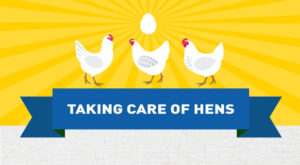Animal Care Program

The Canadian egg industry’s Animal Care Program (ACP) helps ensure that all hens have a safe, healthy and comfortable living environment. Based on the recommended Code of Practice for the Care and Handling of Pullets and Laying Hens, the ACP is regularly reviewed and revised to reflect new knowledge and egg farmers’ commitment to continuous improvement.
The ACP provides guidelines for space, feed, water, lighting, air quality, hen handling and more. On-farm compliance is verified through extensive record keeping, annual inspections by a trained team of field inspectors, and independent third-party auditing.
Animal Care Program requirements include:
- Scoring at least 90% overall
- Not missing any critical care elements
- Missing a maximum of 1 care element
- Adhering to the Farm Animal Welfare Policy
- Adhering to the Employee Code of Conduct
- Adhering to the Visitor Policy and Code of Conduct
- Completing routine inspections for:
- Barn environment (temperature, lighting, ammonia levels)
- Feed and water systems
- Sick or suffering birds
- Space for the birds
- Beak treatment for the birds
- Feather condition of the birds
- Adhering to bird Handing, Catching and Loading guidelines
- Adhering to plan for humane depopulation and euthanasia
- Establishing an emergency plan that all employees are familiar with
Farm Animal Welfare Policy – documents expectations for everybody working on the farm, which must include an emphasis on committing to pass the Animal Care Program and a zero-tolerance policy related to abuse of the birds. Every farmer must review and sign the policy annually.
Employee Code of Conduct – documents commitment by each employee to abide by the Farm Animal Welfare Policy, acknowledgement that they fully understand all the requirements of the Animal Care Program and are dedicated to caring for the birds in a compassionate manner, and agreement to report any concern about the treatment of the birds to the farmer immediately. Every employee must review and sign the Code of Conduct annually.
Visitor Policy & Code of Conduct – documents commitment by each visitor to abide by the Farm Animal Welfare Policy, acknowledgement that they will respect the rules and direction provided by the farmer, and agreement to report any concern about the treatment of the birds to the farmer immediately. Every visitor must review the Visitor Policy and sign the Code of Conduct each time they visit a registered layer barn.
Handing, Catching & Loading Guidelines – documents best practices for handling, catching and loading hens, which every employee must be trained on.
If any farmer does not achieve the ACP scoring requirements a Corrective Action Request (CAR) will be issued immediately. Depending on the nature of the CAR, farmers have 7-30 days to resolve the issue, which is followed by a re-audit on the areas of non-conformance. Failure to do so will result in fines and can potentially lead to having the farmer’s license to produce eggs revoked.
Did you know? The Animal Care Program average score in 2021 was 99.68%, in 2022 it was 99.86%, and in 2023 it was 99.93%
